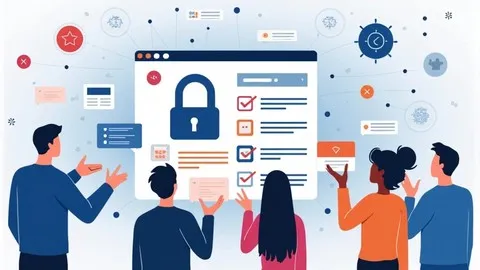Certified Information Privacy Manager (Cipm) Exam Prep
Published 5/2025
MP4 | Video: h264, 1920x1080 | Audio: AAC, 44.1 KHz
Language: English | Size: 2.14 GB | Duration: 7h 21m
Published 5/2025
MP4 | Video: h264, 1920x1080 | Audio: AAC, 44.1 KHz
Language: English | Size: 2.14 GB | Duration: 7h 21m
Comprehensive CIPM theory prep covering all domains with 20+ practice questions to solidify exam readiness.
What you'll learn
Define CIPM privacy program scope by mapping data inventories, flows and aligning with business model and risk appetite.
Establish governance: craft privacy policies, define roles, team structure, and stakeholder responsibilities according to CIPM guidance.
Design and apply privacy metrics, audits, and monitoring processes to measure program performance and ensure compliance.
Perform data risk assessments, including gap analyses, vendor evaluations, and technical and physical control reviews.
Requirements
Basic understanding of privacy and data protection concepts, familiarity with major privacy laws (e.g., GDPR, CCPA), access to the IAPP CIPM Body of Knowledge, and a reliable internet connection.
Description
Are you ready to lead enterprise privacy programs and succeed on the Certified Information Privacy Manager (CIPM) exam? This course offers a structured, academic yet accessible approach to mastering the core domains of CIPM, from program framework to incident response and continuous improvement.You will begin by defining the scope of a privacy program, mapping data inventories and flows, and aligning your strategy with organizational context and risk appetite. Next, you will establish effective governance by crafting privacy policies, defining team roles, and engaging stakeholders across legal, IT, HR, marketing and executive leadership. With a solid foundation in place, you will explore the operational lifecycle—conducting gap analyses against privacy standards, evaluating third-party vendor risks, and reviewing physical and technical controls.Our curriculum delves into privacy by design, data classification and access controls, metrics development, program audits, and ongoing compliance monitoring. You will learn to build dashboards, conduct privacy impact assessments, and implement tools to measure and communicate performance to executives. The course also covers critical skills for responding to data subject access requests (DSARs), managing consent, and handling breach incidents—complete with documentation templates and post-incident review practices.Throughout the lessons, you will encounter 20 realistic sample exam questions. Each question appears after relevant topics and includes four answer options with the correct choice clearly marked. These questions reinforce your understanding and help you gauge readiness as you progress through each domain.By the end of this course, you will have a comprehensive theoretical foundation aligned with the official CIPM Body of Knowledge. You will be able to design, implement, sustain and improve an enterprise privacy program with confidence. With concise lessons, practical exercises, and targeted quizzes, you will be fully prepared to approach the CIPM exam with clarity and competence.Note: This course is not an official IAPP preparation course and is not affiliated with the International Association of Privacy Professionals (IAPP). It is an independent preparatory guide based on publicly available information. The content is designed to be academic in tone yet accessible to learners at all levels.This course delivers additional study aids including a customized privacy glossary, policy and procedure templates, audit and assessment checklists, and communication scripts to streamline your exam preparation. Each resource is designed to support your study plan and can be used in real-world privacy program tasks. You will also receive guidance on mapping your learning progress, tips for time management during the exam, and recommendations for continued professional development after earning your CIPM credential. Embark on this structured learning path, master essential privacy management theory, and build the confidence to lead privacy initiatives in any organization.
Overview
Section 1: Intro
Lecture 1 Introduction
Section 2: Privacy Program: Developing a Framework
Lecture 2 Defining Program Scope and Data Inventory
Lecture 3 Business Model and Risk Appetite
Lecture 4 Governance Model and Team Structure
Lecture 5 Stakeholders and Internal Partnerships
Lecture 6 Sample Question Program Scope
Lecture 7 Vision, Communication, and Awareness
Lecture 8 Privacy Vocabulary and Training Access
Lecture 9 Sample Question Communication and Training
Section 3: Privacy Program: Establishing Program Governance
Lecture 10 Applicable Laws and Regulations
Lecture 11 Global Privacy Considerations
Lecture 12 Crafting Privacy Policies and Procedures
Lecture 13 Data Retention and Incident Planning
Lecture 14 Sample Question Data Retention Policy
Lecture 15 Clarifying Roles and Responsibilities
Lecture 16 Incident Response Roles and Accountability
Lecture 17 Sample Question Breach Responsibilities
Section 4: Program Governance: Policies, Metrics, and Compliance
Lecture 18 Developing Privacy Metrics
Lecture 19 Conducting Privacy Audits and Monitoring
Lecture 20 Training and Awareness Programs
Lecture 21 Ongoing Privacy Activities
Lecture 22 Monitoring Compliance and Enforcement
Lecture 23 Sample Question Privacy Audits
Lecture 24 Sample Question Measuring Program Success
Section 5: Privacy Program Operational Life Cycle: Assessing Data (Part 1)
Lecture 25 Documenting Data Governance Systems
Lecture 26 Gap Analysis Against Standards
Lecture 27 Evaluating Processors and Third-Party Vendors
Lecture 28 Vendor Risk Assessment Procedures
Lecture 29 Performing Privacy Gap Analysis
Lecture 30 Sample Question Data Assessment
Section 6: Privacy Program Operational Life Cycle: Assessing Data (Part 2)
Lecture 31 Evaluating Physical and Environmental Controls
Lecture 32 Technical Controls – Systems and Infrastructure
Lecture 33 Technical Controls – Data Use and Retention
Lecture 34 Collaborating on Technical Controls
Lecture 35 Evaluating Shared Data in Mergers and Acquisitions
Lecture 36 Contractual Risk and Control Alignment
Lecture 37 Sample Question Physical Controls
Lecture 38 Sample Question Technical Controls
Section 7: Privacy Program Operational Life Cycle: Protecting Personal Data
Lecture 39 Data Classification and Access Controls
Lecture 40 Implementing Security Measures
Lecture 41 Privacy by Design Principles
Lecture 42 Integrating Privacy into Development and Processes
Lecture 43 Organizational Guidelines and Technical Safeguards
Lecture 44 Sample Question Data Classification
Lecture 45 Sample Question Privacy by Design
Section 8: Privacy Program Operational Life Cycle: Sustaining Program Performance
Lecture 46 Using Metrics to Measure Performance
Lecture 47 Analyzing Metrics and Trends
Lecture 48 Auditing the Privacy Program
Lecture 49 Compliance Monitoring and Reviews
Lecture 50 Continuous Assessments and Improvement
Lecture 51 Sample Question Privacy Impact Assessment
Section 9: Privacy Program Operational Life Cycle: Responding to Data Requests
Lecture 52 Privacy Notices and Data Subject Rights
Lecture 53 Consent, Correction, and Objections
Lecture 54 Handling Access Requests and Portability
Lecture 55 International Privacy Laws and Requirements
Lecture 56 Sample Question Data Subject Access Request
Lecture 57 Sample Question Data Subject Rights
Section 10: Privacy Program Operational Life Cycle: Incidents and Breaches
Lecture 58 Incident Impact Assessment and Containment
Lecture 59 Remediation and Communication
Lecture 60 Documentation and Team Coordination
Lecture 61 Post-Incident Review and Plan Evaluation
Lecture 62 Updating the Incident Response Plan
Lecture 63 Sample Question Initial Response
Lecture 64 Sample Question Continuous Improvement
Section 11: Privacy Program Leadership and Emerging Issues
Lecture 65 Integrating Privacy into Corporate Culture
Lecture 66 Ethical Data Management
Lecture 67 Emerging Technologies and AI Risk
Lecture 68 Advanced Compliance Certifications and Frameworks
Lecture 69 Global Privacy Trends
Lecture 70 Continuous Professional Development
Lecture 71 Sample Question Executive Support
Lecture 72 Sample Question AI Privacy Risk
Section 12: Conclusions
Lecture 73 Summary
Professionals aiming to earn the CIPM certification—privacy managers, information security officers, compliance specialists, consultants or anyone responsible for designing and managing enterprise privacy programs.



